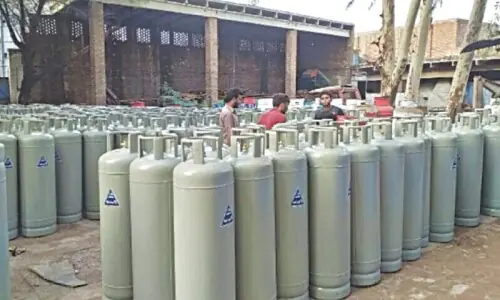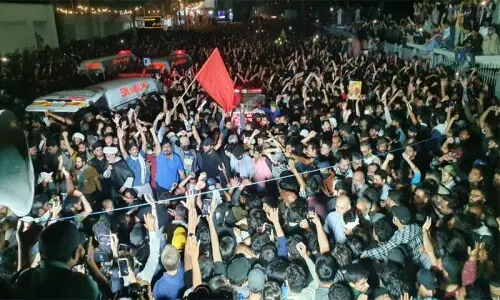SEHWAN SHARIF: Yielding to the hypnotic beat of drums and the intoxicating scent of incense, the woman danced herself into a state of trance, laughing and shaking uncontrollably alongside hundreds of others at Pakistan's most revered Sufi shrine.
Swathed in red, the Sufi colour of passion, she shouted invocations to the shrine's patron saint in an ecstatic ritual repeated daily in the dusty town of Sehwan Sharif on the banks of the river Indus.
With its hypnotic rituals, ancient mysticism and a touch of intoxicated madness, Sufism is a form of Islam which has been practised in Pakistan for centuries — a powerful antidote to extremism in places such as the province of Sindh.
It is scenes like this, where men and women dance together in a fervent celebration of their faith, that make Sufis an increasingly obvious target in the conservative country where sectarian violence is on the rise.
At a crossroads of historic trade routes, religions and cultures, Sindh has always been a poor but religiously tolerant place, shielded by its embrace of Sufism from religion-centric militancy sweeping other parts of Pakistan.
But this year peace came to an end with a string of attacks across the province, including against Sufi places of worship, as militants seek new safe havens and new ways of destabilising the country.
"They are trying to kill us," said Syed Sarwar Ali Shah Bukhari, whose father, a Sufi cleric, was killed in a bomb attack on the family's ancestral shrine in February.
Bukhari, 36, is now the oldest living descendant of a prominent Sufi "saint" whose tomb his family has tended for generations in a tradition handed down from father to son.
"It was never like this before," Bukhari, wearing a black turban and silver embroidered slippers, said nervously outside the Dargah Ghulam Shah Gazi shrine, its vast dome shining bright above the bleak mud-brick homes of his native Maari village.
"Suddenly everyone is hostile towards us. People are afraid," added Bukhari, who took over as the shrine's resident saint and custodian after the death of his father.
Irredeemable heretics
The influx of Taliban-inspired gangs into Sindh is a disturbing development in a country where Prime Minister Nawaz Sharif's government is already struggling to contain a Taliban insurgency and escalating religious violence.
"In Sindh, militancy was not common until now. It was known for its tolerance," said Abdul Khalique Shaikh, a senior police officer who investigated this year's Sufi attacks.
"You can hardly find any Sindh-based religious extremists here."
Insurgents see Sufis as irredeemable heretics who deserve to die. Long entrenched in their tribal safe havens on Pakistan's border with Afghanistan, militants are seeping quietly into vulnerable, less protected areas, establishing cells in unlikely new places such as rural Sindh.
Sindh is home to Pakistan's violent city of Karachi, long infiltrated by the Taliban. But until now, its rural interior has been of little interest to insurgents.
Police say there is evidence suggesting a group of well trained militants had been deployed in Sindh to prepare for more attacks.
"All of them are jihadists (Islamist militants). All of them were in Afghanistan," said Shaikh, the senior police officer.
Taliban-friendly seminaries — some funded by Middle East money — have sprung up around Sindh to inspire men to holy war. Men collecting donations often loiter outside radical mosques.
The striped black and white flag of pro-Taliban groups flap on street corners across rural Sindh — a novelty in these parts.
Lashkar-i-Jhangvi, a radical Sunni sectarian outfit, has also made inroads into Sindh from the neighbouring Punjab province, setting up seminaries to spread its ideology.
Security sources said militants in rural Sindh are based around the cities of Shikarpur and Sukkur. Zulfikar Memon, 33, who was wounded in the February attack in Maari, said a religious school had been opened in Shikarpur just before the blast.
"Before there were no Taliban madrassahs here," he said. "They are brainwashing young people. ... It's not in our power to do anything. We just follow our spiritual leader."
Days before Bukhari's father was killed, another cleric from the nearby town of Qambar survived a bomb attack on his car.
In May, Ibrahim Jatoi, a Shia politician, narrowly escaped death when his convoy was hit by a suicide bomber near Shikarpur — the first sectarian assault of this kind in rural Sindh.
And, just a month after Sharif came to power, insurgents struck at the heart of Sindh's military apparatus, attacking an intelligence compound in Sukkur. Seven were killed.
"Historically we Sindhis are not conservative or religious. We are secular," said Shahzaib Chandio, 30, as he scanned shelves at a local library for books about Europe. "Those terrorists are from tribal areas. Security is now very fragile."
“We’re a soft target”
Steeped in centuries of subcontinental folklore, poetry and spiritualism, Sufism reflects the mystical side of Islam and involves scenes unthinkable in most other parts of Pakistan.
At Sehwan Sharif, drums conjuring up the spirit of 13th-century saint Lal Shahbaz Qalandar beat hypnotically. Wisps of incense swirl like ancient spirits. Fervent in their joy, men and women dance and sing with an intensity that sends many into a trance.
The Taliban, who believe music should be banned and women kept at home, are furious at such passionate free expression.
"Women and men dance together, and that is totally against Islam," said Shahidullah Shahid, a spokesman for the Pakistani Taliban. "We have a large number of fighters in Sindh. We will target everything which is against Sharia (Islamic law)."
Every year a million pilgrims descend on Sehwan, a maze of lanes teeming with people, donkeys and dervishes clad in red robes, for a major festival at its intricately decorated shrine.
For residents, the extravaganza is the source of excitement and much-needed income. For militants, it's a target.
"People believe the Qalandar (saint) will save them. He will protect us," said Syed Muhammad Raza Shah, a Sufi student and son of the shrine's custodian. "We are a very soft target."
In Qambar, a ramshackle town in the shadow of rocky hills separating Sindh from the lawless province of Balochistan, Sufis said only a miracle could save them after their spiritual leader Syed Ghulam Hussain Shah narrowly survived an attack this year.
The seminary is packed with turbaned students of all ages, with older, bearded peers poring over religious texts and singing Arabic verses in dimly lit, rose water scented rooms.
The memory of death hangs heavily amid its stone walls. This is where Pakistan's former prime minister Benazir Bhutto came for spiritual guidance just days before she was killed in 2007.
"The enemies of Islam are killing people. Satanic forces are behind all this," said Shah as he recalled the day Bhutto sat in front of him, asking questions and crying.
"The way this government and this country are run, I can see no hope in anything. People are not safe even inside their own houses ... May God keep us all safe."


































